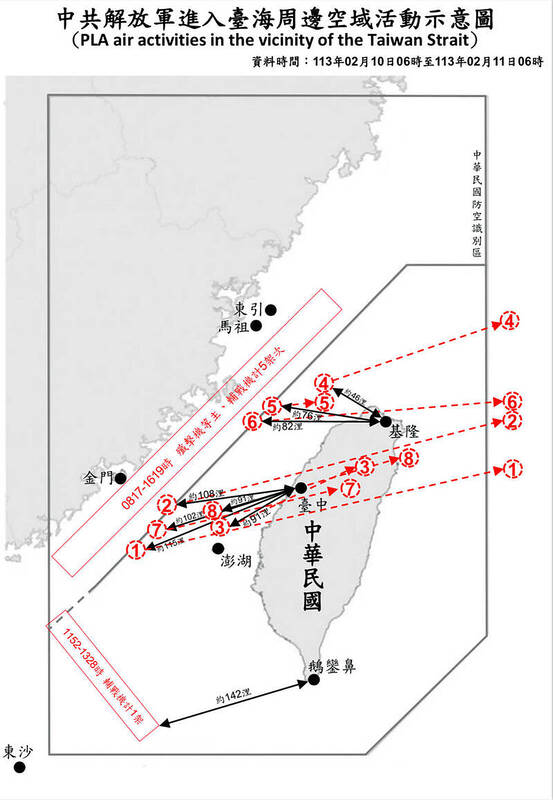A record six Chinese balloons flew across Taiwan between 6am on Saturday and 6am yesterday, the Ministry of National Defense (MND) said.
In its daily report on Chinese military activities, the ministry said that the six balloons were among eight that crossed the median line of the Taiwan Strait during the 24-hour period.
The eight balloons were detected between 10:05am and 3:34pm on Saturday at altitudes of 3,658m to 10,668m, it said.

Photo courtesy of the Ministry of National Defense
Of the six that crossed Taiwan, some flew over Keelung in the north, while the others flew near Taichung, it added.
The ministry did not comment on the type of balloons involved or say why Beijing had sent them across the median line.
The median line in the Taiwan Strait served for decades as a tacit border, but the Chinese military has sent more aircraft, warships and drones across it since then-US House of Representatives speaker Nancy Pelosi visited Taiwan in August 2022.
Saturday and yesterday marked the first day and second day of the new lunar year, which is celebrated on both sides of the Taiwan Strait, as well as by Chinese communities across the globe.
A military spokesman last month said that the daily sending of balloons to Taiwan was part of Chinese “gray zone” tactics in the run-up to the presidential and legislative elections on Jan. 13 and meant to “harass and rattle Taiwanese.”
The military has generally assessed the balloons as being for meteorological purposes, a conclusion drawn in part from its investigation of balloon debris found in February last year around Dongyin Island (東引).
The ministry last year said that similar equipment had been regularly detected in the air and sea around Taiwan, most often between December and February, because seasonal winds bring the balloons closer to Taiwan.
Speaking at a press event on Jan. 9, Colonel Wang Chia-chun (王家駿), deputy head of ministry’s joint operations planning section, said that shooting down the balloons would be “a waste of ammunition” and the exact response China wants from Taiwan.
Taiwan’s standard military response is to issue alerts to the relevant authorities and to closely monitor the balloons’ movements, particularly if they are found to be flying near more densely populated areas, he added.

SECURITY: As China is ‘reshaping’ Hong Kong’s population, Taiwan must raise the eligibility threshold for applications from Hong Kongers, Chiu Chui-cheng said When Hong Kong and Macau citizens apply for residency in Taiwan, it would be under a new category that includes a “national security observation period,” Mainland Affairs Council (MAC) Minister Chiu Chui-cheng (邱垂正) said yesterday. President William Lai (賴清德) on March 13 announced 17 strategies to counter China’s aggression toward Taiwan, including incorporating national security considerations into the review process for residency applications from Hong Kong and Macau citizens. The situation in Hong Kong is constantly changing, Chiu said to media yesterday on the sidelines of the Taipei Technology Run hosted by the Taipei Neihu Technology Park Development Association. With

A US Marine Corps regiment equipped with Naval Strike Missiles (NSM) is set to participate in the upcoming Balikatan 25 exercise in the Luzon Strait, marking the system’s first-ever deployment in the Philippines. US and Philippine officials have separately confirmed that the Navy Marine Expeditionary Ship Interdiction System (NMESIS) — the mobile launch platform for the Naval Strike Missile — would take part in the joint exercise. The missiles are being deployed to “a strategic first island chain chokepoint” in the waters between Taiwan proper and the Philippines, US-based Naval News reported. “The Luzon Strait and Bashi Channel represent a critical access

‘FORM OF PROTEST’: The German Institute Taipei said it was ‘shocked’ to see Nazi symbolism used in connection with political aims as it condemned the incident Sung Chien-liang (宋建樑), who led efforts to recall Democratic Progressive Party (DPP) Legislator Lee Kun-cheng (李坤城), was released on bail of NT$80,000 yesterday amid an outcry over a Nazi armband he wore to questioning the night before. Sung arrived at the New Taipei City District Prosecutors’ Office for questioning in a recall petition forgery case on Tuesday night wearing a red armband bearing a swastika, carrying a copy of Adolf Hitler’s Mein Kampf and giving a Nazi salute. Sung left the building at 1:15am without the armband and apparently covering the book with a coat. This is a serious international scandal and Chinese

COUNTERINTELLIGENCE TRAINING: The ministry said 87.5 percent of the apprehended Chinese agents were reported by service members they tried to lure into becoming spies Taiwanese organized crime, illegal money lenders, temples and civic groups are complicit in Beijing’s infiltration of the armed forces, the Ministry of National Defense (MND) said in a report yesterday. Retired service members who had been turned to Beijing’s cause mainly relied on those channels to infiltrate the Taiwanese military, according to the report to be submitted to lawmakers ahead of tomorrow’s hearing on Chinese espionage in the military. Chinese intelligence typically used blackmail, Internet-based communications, bribery or debts to loan sharks to leverage active service personnel to do its bidding, it said. China’s main goals are to collect intelligence, and develop a